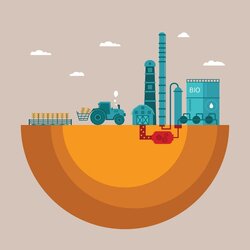Expertise
Scenarios for a bio-based future
Viktoriya Sturm | 27.05.2022
With the help of models, we analyse how a bio-based economy can develop in the future. In addition, we investigate the social demands and expectations placed on the bioeconomy.
The use of models enables us to consider numerous interrelationships and feedbacks and thus identify the potentials of the bioeconomy, as well as its trade-offs. For example, we can quantify how different intensities of biofuel production, material use of biomass and consumption of animal products affect the total demand for biomass in Germany.
Scenarios are used to describe which developments the models should depict. Scenarios represent exemplary but plausible alternative options for future developments. The process of scenarios development takes place with the involvement of experts, stakeholders and citizens.
Based on our results, we derive recommendations for policy-makers on how to shape transformation processes in a way that set sustainability goals are achieved, while ensuring that the underpinning policies are widely accepted in society.
Modeling
For scenario modelling, one specific model or a set of selected models is used. We use our own models AGMEMOD, MAGNET, FGTM, but also cooperate with partners who have models with other focuses. We are also working on the further development of our models to make them fit for bioeconomy modelling.
In the European BioMonitor project, we are together with our partners developing a new partial equilibrium model for bio-based products with a focus on the chemical industry called BioMAT.
BioMAT will represent two processing stages of biomass. The first stage of the value chain involves processing biomass into bio-based feedstocks for the chemical industry, such as technical starches, industrial sugars, and vegetable oils. These products then enter the second stage of the value chain, where they are processed into semi-finished bio-based products such as polymers, lubricants, solvents, biofuels and paper.
Citizen participation
In the interdisciplinary research project BEPASO, we discussed the opportunities and risks of the bioeconomy in Germany together with experts, interest groups and the general public and developed three transformation scenarios toward a bioeconomy by 2050. In doing so, it was an important concern of the project to investigate the citizens' perspective and to make it part of the scenarios.
We have identified different public views on the bioeconomy, analysed assessment and acceptance of the scenarios and elaborated expectations and requests to policy makers. Both qualitative and quantitative methods were used for this purpose.
Our investigation has shown that citizens have very different attitudes towards the bioeconomy or towards different aspects of a bio-based economy. Some aspects and the measures associated with them appear to the respondents to be very remote from everyday life while others seem to be very close to their daily routines. With regard to their fundamental views and especially with a focus on environmental protection and the role of new technology, we were able to identify different groups in the population: "Innovative supporters", "Conservative environmentalists" and "Uninvolved".
Citizens see the need for a proactive role of politicians for the sustainable transformation towards the bioeconomy, but at the same time they reject any paternalism by policy makers. They see an additional tax burden as a consequence of the policy critically and emphasise that ways should be found to compensate low-income groups.
Download Service
- BEPASO BroschüreEine biobasierte Zukunft in Deutschland – Szenarien und gesellschaftliche Herausforderungen (in German)
- [Thünen Working Paper 115Bioökonomie aus Sicht der Bevölkerung (in German)







